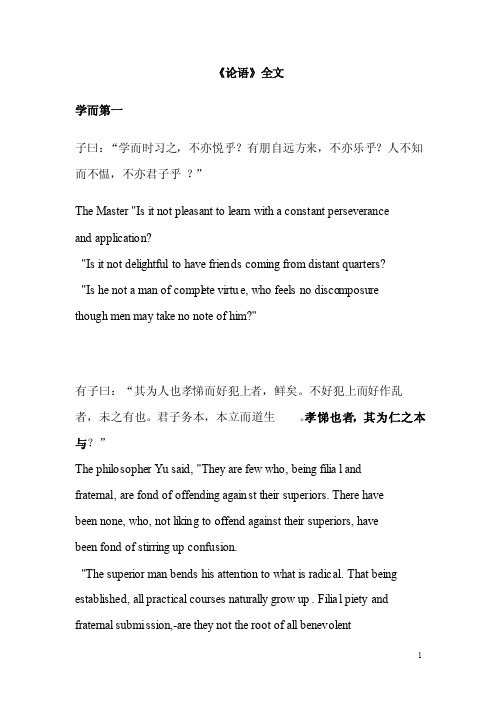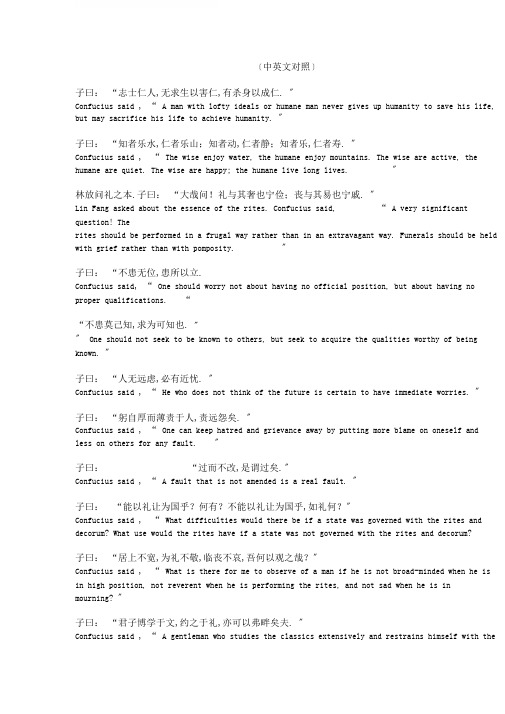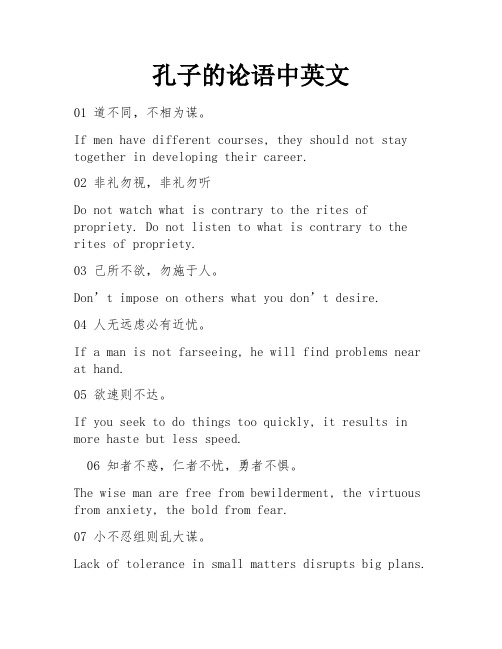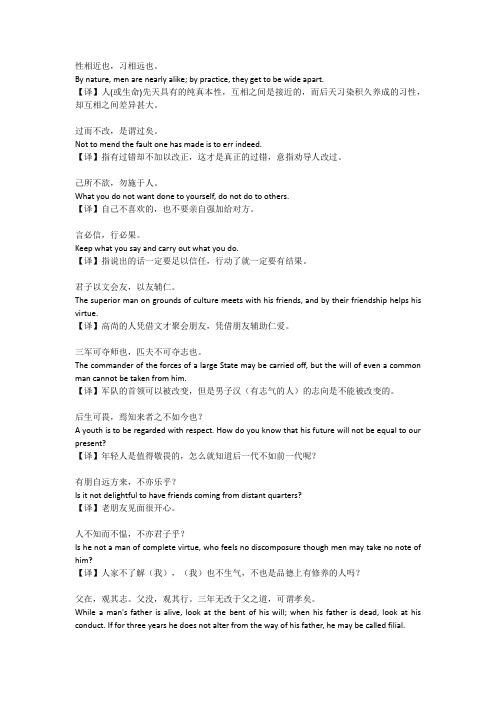《论语》中英文对照版
论语十二章全文翻译

论语十二章全文翻译《论语十二章》全文翻译1、子曰:“学而时习之,不亦说乎?有朋自远方来,不亦乐乎?人不知而不愠,不亦君子乎?”译文:孔子说:“学习了知识然后按时温习,不是很愉快吗?有志同道合的人从远方来,不是很快乐吗?人家不了解我,我却不恼怒,不也是有才德的人吗?”2、曾子曰:“吾日三省吾身:为人谋而不忠乎?与朋友交而不信乎?传不习乎?”译文:曾子说:“我每天多次反省自己:替别人办事是不是尽心竭力了呢?同朋友交往是不是诚实可信了呢?老师传授的知识是不是复习了呢?”3、子曰:“吾十有五而志于学,三十而立,四十而不惑,五十而知天命,六十而耳顺,七十而从心所欲,不逾矩。
”译文:孔子说:“我十五岁开始有志于做学问,三十岁能独立做事情,四十岁能(通达事理)不被外物所迷惑,五十岁能知道哪些是不能为人力所支配的事情,六十岁能听得进不同的意见,到七十岁做事才能随心所欲,不会超过规矩。
”4、子曰:“温故而知新,可以为师矣。
”译文:孔子说:“温习学过的知识,可以从中获得新的理解与体会,那么就可以凭借这一点去做老师了。
”5、子曰:“学而不思则罔,思而不学则殆。
”译文:孔子说:“只是学习却不思考就会感到迷茫而无所适从,只是空想却不学习就会心中充满疑惑而无所得。
”6、子曰:“贤哉,回也!一箪食,一瓢饮,在陋巷,人不堪其忧,回也不改其乐。
贤哉,回也!”译文:孔子说:“颜回的品质是多么高尚啊!一竹篮饭,一瓢水,住在简陋的小巷子里,别人都忍受不了这种穷困清苦,颜回却没有改变他好学的乐趣。
颜回的品质是多么高尚啊!”7、子曰:“知之者不如好之者,好之者不如乐之者。
”译文:孔子说:“知道学习的人比不上爱好学习的人,爱好学习的人比不上以学习为快乐的人。
”8、子曰:“饭疏食,饮水,曲肱而枕之,乐亦在其中矣。
不义而富且贵,于我如浮云。
”译文:孔子说:“吃粗粮,喝冷水,弯着胳膊当枕头,乐趣也就在这中间了。
用不正当的手段得来的富贵,对于我来讲就像是天上的浮云一样。
《论语》全文中英对照

《论语》全文学而第一子曰:“学而时习之,不亦悦乎?有朋自远方来,不亦乐乎?人不知而不愠,不亦君子乎?”The Master "Is it not pleasa nt to learnwith a consta nt persev eranc eand applic ation?"Is it not deligh tfulto have friend s coming from distan t quarte rs?"Is he not a man of comple te virtue, who feelsno discom posur ethough men may take no note of him?"有子曰:“其为人也孝悌而好犯上者,鲜矣。
不好犯上而好作乱者,未之有也。
君子务本,本立而道生。
孝悌也者,其为仁之本与?”The philos opher Yu said, "They are few who, beingfilial andfrater nal, are fond of offend ing agains t theirsuperi ors. Therehavebeen none, who, not liking to offend agains t theirsuperi ors, havebeen fond of stirri ng up confus ion."The superi or man bendshis attent ion to what is radica l. That beingestabl ished, all practi cal course s natura lly grow up. Filial pietyandfrater nal submis sion,-are they not the root of all benevo lentaction s?"子曰:“巧言令色,鲜矣仁。
完整版论语选段翻译中英文对照

〔中英文对照〕子曰:“志士仁人,无求生以害仁,有杀身以成仁. 〞Confucius said , “ A man with lofty ideals or humane man never gives up humanity to save his life, but may sacrifice his life to achieve humanity. 〞子曰:“知者乐水,仁者乐山;知者动,仁者静;知者乐,仁者寿. 〞Confucius said , “ The wise enjoy water, the humane enjoy mountains. The wise are active, the humane are quiet. The wise are happy; the humane live long lives. 〞林放问礼之本.子曰:“大哉问!礼与其奢也宁俭;丧与其易也宁戚. 〞Lin Fang asked about the essence of the rites. Confucius said, “ A very significant question! Therites should be performed in a frugal way rather than in an extravagant way. Funerals should be held with grief rather than with pomposity. 〞子曰:“不患无位,患所以立.Confucius said, “ One should worry not about having no official position, but about having no proper qualifications. ““不患莫己知,求为可知也. "〞One should not seek to be known to others, but seek to acquire the qualities worthy of being known. 〞子曰:“人无远虑,必有近忧. 〞Confucius said , “ He who does not think of the future is certain to have immediate worries. 〞子曰:“躬自厚而薄责于人,责远怨矣. 〞Confucius said , “ One can keep hatred and grievance away by putting more blame on oneself and less on others for any fault. 〞子曰:“过而不改,是谓过矣. 〞Confucius said , “ A fault that is not amended is a real fault. 〞子曰:“能以礼让为国乎?何有?不能以礼让为国乎,如礼何?〞Confucius said , “ What difficulties would there be if a state was governed with the rites and decorum? What use would the rites have if a state was not governed with the rites and decorum?子曰:“居上不宽,为礼不敬,临丧不哀,吾何以观之哉?〞Confucius said , “ What is there for me to observe of a man if he is not broad-minded when he is in high position, not reverent when he is performing the rites, and not sad when he is in mourning? 〞子曰:“君子博学于文,约之于礼,亦可以弗畔矣夫. 〞Confucius said , “ A gentleman who studies the classics extensively and restrains himself with therites will not depart from the Way.子曰:“弟子入那么孝,出那么弟〞Confucius said , “ Young people should be filial to their parents at home and respectful to their brothers when they are with them. 〞〞谨而信,泛爱众,而亲仁. “〞They should be serious and trustworthy, love the populace extensively and be close to those who are humane. “行有余力,那么以学文. 〞“ When all this is done and there is time for other things, they should use it for the study ofthe classics. 〞子曰:“父母在,不远游,游必有方. 〞Confucius said , “ While one ’ s parents are alive, one should not travel to distant places. If it isnecessary to travel, there should be a definite direction. 〞子曰:“岁寒,然后知松柏之后凋也. 〞Confucius said , “ Only in cold winter does one know that the pine and the cypress are the last to shed their leaves. 〞子曰:“君子喻于义,小人喻于利. 〞Confucius said , “ The gentleman knows what is right; the mean person keeps his mind only on gains."子曰:“君子周而不比,小人比而不周. 〞Confucius said “, The gentleman unites and does not plot with others; the mean man plots and does not unite wi th others. 〞子曰:“君子和而不同,小人同而不和. 〞Confucius said , “ The gentleman aims at harmony, and not at uniformity. The mean man aims at uniformity, and not at harmony. 〞子曰:“德之不修,学之不讲.闻义不能徒,不善不能改,是吾忧也. 〞Confucius said , “ Neglect of moral cultivation, neglect of learning and practicing what has been learned, failure to follow what is right, and failure to correct what is wrong —these are my ___ ・ _ _ 〞worries. 〞子曰:“益有三乐,损有三乐. "Confucius said , “ Three kinds of pleasure are beneficial, and three kinds pleasure are harmful. “乐节礼乐,乐道人之善,乐多贤友,益矣.The pleasure of being regulated by the rites and music, the pleasure of praising other men’ s goodness, and the pleasure of having many virtuous friends are beneficial." 乐骄乐,乐佚游,乐宴乐,损矣. 〞"The pleasure of being conceited, the pleasure of unrestrained wanderings, and the pleasure of indulging in eating and drinking are harmful. 〞子曰:“见贤思齐焉,见不贤而内自省也. 〞Confucius said , “ When one sees a virtuous man, one should think of exerting oneself to be like him; when one sees someone who is not virtuous, one should examine onself. 〞子曰:“学而时习之,不亦说乎?The Master said, To learn and at due times to repeat what one has learnt, is that not after all a pleasure?有朋自远方来,不亦乐乎?That friends should come to one from afar, is this not after all delightful?人不知而不愠,不亦君子乎?〞To remain unsoured even though one ’ s merits are unrecognized by others, is that not after all what is expected of a gentleman?曾子曰:“吾日三省吾身:Master Tseng said, Every day I examine myself on these three points:为人谋而不忠乎?in acting on behalf of others, have I always been loyal to their interests?与朋友交而不信乎?In intercourse with my friends, have I always been true to my word?传不习乎?〞Have I failed to repeat the precepts that have been handed down to me?有子曰:“礼之用,和为贵.先王之道,斯为美,小大由之.Master Yu said, In the usages of ritual it is harmony that is prized; the Way of the Former Kings from this got its beauty. Both small matters and great depend upon it.有所不行,知和而和,不以礼节之,亦不可行也. “If things go amiss, he who knows the harmony will be able to attune them. But if harmony itself is not modulated by ritual, things will still go amiss.子曰:“吾十有五而志于学,三十而立,四十而不惑,The Master said, "At fifteen I set my heart upon learning. At thirty, I had planted my feet firm upon the ground. At forty, I no longer suffered from perplexities.五十而知天命,六十而耳顺,At fifty, I knew what were the biddings of Heaven. At sixty, I heard them with docile ear.七十而从心所欲,不逾矩. 〞At seventy, I could follow the dictates of my own heart; for what I desired no longer overstepped the boundaries of right. 〞子曰:“其身正,不令而行;其身不正,虽令不从. 〞The Master said, “If the ruler himself is upright all will go well even though he does not give orders. But if he himself is not upright, even though he gives orders, they will not be obeyed.子曰:“三人行,必有我师焉.The Master said, “n wEhven walking in a party of no more than three I can always be certain of learning from those I am with.择其善者而从之,其不善者而改之. 〞There will be good qualities that I can select for imitation and bad ones that will teach me what requires correction in myself. 〞子曰:“出门如见大宾,Confucius said , "When you go out of your home, behave as is you were meeting important guests;使民如承大祭.when you are using the common people ’ lasbor, behave as if you were conducting a solemnsacrificial ceremony.己所不欲,勿施于人.在邦无怨,在家无怨. 〞Do not impose on others what you do not desire yourself. Bear no grudge against the state where you work; have no feeling of dissatisfaction when you stay at home. 〞子曰:“刚、毅、木、讷近仁. 〞Confucius said , “ Being firm, resolute, simple and reticent is close to being humane. 〞子曰:“唯仁者能好人,能恶人. 〞Confucius said , “ Only the humane can love others and hate others.〞子曰:“君子坦荡荡,小人长戚戚. 〞Confucius said, “ The gentleman is open and at ease; the mean man is full of worries and anxieties.〞子曰:“无欲速,无见小利.欲速那么不达,见小利那么大事不成. 〞Confucius said , “ Do not want to do things quickly, and do not seek petty gains. You cannot reach your goal if you want to be quick, and you cannot accomplish great things if you seek pettygains.〞子曰:“有教无类. 〞Confucius said , “ There should be education for everyone without distinction. 〞子曰:“性相近也,习相远也. 〞Confucius said , “ By nature men are similar to one another, but learning and practice make them different. 〞子曰:“学而不思那么罔,思而不学那么殆. 〞Confucius said, “ He who learns without thinking will be bewildered; he who thinks without learning will be in danger. 〞子曰:“温故而知新,可以为师矣. 〞Confucius said , “ He can be a teacher who finds what is new in reviewing what is old. 〞子曰:“三军可夺帅也,匹夫不可夺志. 〞Confucius said, “ Any army may be deprived of its commanding officer, yet a man cannot be deprived of his will. 〞子曰:“由,诲女知之乎?知之为知之,不知为不知,是知也. 〞Confucius said , “ You, shall I teach you what it is to know? You know something if you know it, and you do not know something if you do not. That is what to know means. 〞子曰:“君子讷于言而敏于行. 〞Confucius said , “ The gentleman wishes to be slow in speech but quick in action. 〞子曰:“君子耻其言而过其行. 〞Confucius said , “ The gentleman considers it a shame to talk more than he does.〞子曰:“君子不以言举人,不以人废言. 〞Confucius said , “ The gentleman does not recommend a man because of what he says, nor does he ignore what a man says because of his personality.〞子曰:“默而识之,学而不厌,诲人不倦,何有于我哉?〞Confucius said , “ To commit knowledge to memory quietly, to study tirelessly, and to enlighten others indefatigably —these are not difficult for me. 〞子曰:“见义不为,无勇也. 〞Confucius said , “ It is cowardice not to dare to defend righteousness when it is endangered. 〞子曰:“贤哉回也!The Master said, incomparable indeed was Hui!一箪食,一瓢饮,在陋巷A handful of rice to eat, a gourdful of water to drink, living in a mean street.人不堪其忧,回也不改其乐.贤哉回也!〞Others would have found it unendurably depressing, but to Hui ’ scheerfulness it made no difference at all. Incomparable indeed was Hui!子曰;〞巧言令色,鲜矣也. “The Maser said, “ find words and insinuating appearance are seldom associated with true virtue.子曰:〞逝者如斯夫,不舍昼夜. “The Maser said, “ It passes on just like this, not ceasing day or night! 〞非礼勿视,非礼勿听,非礼勿言,非礼勿动.Look not at what is contrary to propriety; listen not to what is contrary to propriety; speak not what is contrary to propriety; make no movement which is contrary to propriety.唯女子与小人,为难养也.近之那么不孙,远之那么怨.Of all people, girls and servants are the most difficult to behave to. If you are familiar with them, they lose their humility. If you maintain a reserve towards them, they are discontented.关睢乐而不淫,哀而不伤.The Kwan Tsu is expressive of enjoyment without being licentious, and of grief without being hurtfully excessive.诗三百,一言以蔽之,曰:思无邪.In the Book of Poetry are three hundred pieces, but the design of them all may be embraced in one sentence-- "Having no depraved thoughts."不患人之不己知,患不知人也.I will not be afflicted at men's not knowing me; I will be afflicted that I do not know men.父在,观其志.父没,观其行.三年无改于父之道,可谓孝矣.While a man's father is alive, look at the bent of his will; when his father is dead, look at his conduct. If for three years he does not alter from the way of his father, he may be called filial.后生可畏,焉知来者之不如今也?A youth is to be regarded with respect. How do you know that his future will not be equal to our present?君子以文会友,以友辅仁.The superior man on grounds of culture meets with his friends, and by their friendship helps his virtue.言必信,行必果.Keep what you say and carry out what you do.知者不惑,仁者不忧,勇者不惧.The wise are free from perplexities; the virtuous from anxiety; and the bold from fear.君子成人之美,不成人之恶,小人反是.The superior man seeks to perfect the admirable qualities of men, and does not seek to perfect their bad qualities. The mean man does the opposite of this.何以报德?以直报怨,以德报德.With what then will you recompense kindness? Recompense injury with justice, and recompense kindness with kindness.巧言乱德.小不忍,那么乱大谋.Specious words confound virtue. Want of forbearance in small matters confounds great plans.道不同,不相为谋.Those whose courses are different cannot lay plans for one another.。
《论语》十则英文翻译

《论语》十则英文翻译子曰:“学而时习之,不亦说乎有朋自远方来,不亦乐乎人不知而不愠,不亦君子乎”The Master said, To learn and at due times to repeat what one has learnt, is that not after all a pleasure That friends should come to one from afar, is this not after all delightful To remain unsoured even though one’s merits are unrecognized by others, is that not after all what is expected of a gentleman?曾子曰:“吾日三省吾身:为人谋而不忠乎与朋友交而不信乎传不习乎”Master Tseng said, Every day I examine myself on these three points: in acting on behalf of others, have I always been loyal to their interests In intercourse with my friends, have I always been true to my word Have I failed to repeat the preceptsthat have been handed down to me?有子曰:“礼之用,和为贵。
先王之道,斯为美,小大由之。
有所不行,知和而和,不以礼节之,亦不可行也。
Master Yu said, In the usages of ritual it is harmony that is prized; the Way of the Former Kings from this got its beauty. Both small matters and great depend upon it. If things go amiss, he who knows the harmony will be able to attune them. But if harmony itself is not modulated by ritual, things will still go amiss.子曰:“吾十有五而志于学,三十而立,四十而不惑,五十而知天命,六十而耳顺,七十而从心所欲,不逾矩。
《论语》十则英文翻译

《论语》十则英文翻译子曰:“学而时习之,不亦说乎?有朋自远方来,不亦乐乎?人不知而不愠,不亦君子乎?”The Master said, To learn and at due times to repeat what one has learnt, is that not after all a pleasure? That friends should come to one from afar, is this not after all delightful? To remain unsoured even though one’s merits are unrecognized by others, is that not after all what is expected of a gentleman?曾子曰:“吾日三省吾身:为人谋而不忠乎?与朋友交而不信乎?传不习乎?”Master Tseng said, Every day I examine myself on these three points: in acting on behalf of others, have I always been loyal to their interests? In intercourse with my friends, have I always been true to my word? Have I failed to repeat the preceptsthat have been handed down to me?有子曰:“礼之用,和为贵。
先王之道,斯为美,小大由之。
有所不行,知和而和,不以礼节之,亦不可行也。
Master Yu said, In the usages of ritual it is harmony that is prized; the Way of the Former Kings from this got its beauty. Both small matters and great depend upon it. If things go amiss, he who knows the harmony will be able to attune them. But if harmony itself is not modulated by ritual, things will still go amiss.子曰:“吾十有五而志于学,三十而立,四十而不惑,五十而知天命,六十而耳顺,七十而从心所欲,不逾矩。
孔子的论语中英文

孔子的论语中英文01 道不同,不相为谋。
If men have different courses, they should not stay together in developing their career.02 非礼勿视,非礼勿听Do not watch what is contrary to the rites of propriety. Do not listen to what is contrary to the rites of propriety.03 己所不欲,勿施于人。
Don’t impose on others what you don’t desire.04 人无远虑必有近忧。
If a man is not farseeing, he will find problems near at hand.05 欲速则不达。
If you seek to do things too quickly, it results in more haste but less speed.06 知者不惑,仁者不忧,勇者不惧。
The wise man are free from bewilderment, the virtuous from anxiety, the bold from fear.07 小不忍组则乱大谋。
Lack of tolerance in small matters disrupts big plans.08 见贤思齐,见不贤而内自省也。
When we see a man of true virtue, we should think of equaling them. When we see an unethical man, we should look inwards and reflect on ourselves.09 工欲善其事必先利其器。
The mechanic, who wishes to do his work well, must sharpen his tools first.10 父母在,不远游, 游必有方。
孔子《论语》全文及译文精选全文完整版

可编辑修改精选全文完整版孔子《论语》全文及译文孔子《论语》全文及译文导语:《论语》主要记录孔子及其弟子的言行,较为集中地反映了孔子的思想,由孔子弟子及再传弟子编写而成,至汉代成书。
下面是小编收集整理的孔子《论语》全文及译文,供各位阅读和借鉴。
《论语》全文及译文1、子曰:“学而时习之,不亦说乎?有朋自远方来,不亦乐乎?人不知而不愠,不亦君子乎?”译文孔子说:“学了又时常温习和练习,不是很愉快吗?有志同道合的人从远方来,不是很令人高兴的吗?人家不了解我,我也不怨恨、恼怒,不也是一个有德的君子吗?”2、子曰:“巧言令色,鲜矣仁。
”译文孔子说:“花言巧语、满脸堆笑的,这种人是很少有仁德的。
”3、曾子曰:“吾日三省吾身,为人谋而不忠乎?与朋友交而不信乎?传不习乎?”译文曾子说:“我每天都要多次反省自己:为别人出主意做事,是否忠实?交友是否守信?老师传授的知识,是否复习了呢?”4、子曰:“君子食无求饱,居无求安,敏于事而慎于言,就有道而正焉,可谓好学也已。
”译文孔子说:“君子吃不追求饱足,住不追求安逸,做事灵敏,言谈谨慎,时时改正自己的错误,就算好学了。
”5、子曰:“不患人之不己知,患不知人也。
”译文孔子说:“不怕没人了解自己,就怕自己不了解别人。
”6、子曰:“《诗》三百,一言以蔽之,曰:‘思无邪。
’”译文孔子说:“《诗经》三百(零五)首,用一句话可以概括,即:‘思想纯正,没有邪恶的东西。
’”7、子曰:“吾十有五而志于学,三十而立,四十而不惑,五十而知天命,六十而耳顺,七十而从心所欲,不逾矩。
”译文孔子说:“我十五岁,有志于学问;三十岁,(懂礼仪,)说话做事都有把握;四十岁,(掌握了各种知识,)不致迷惑;五十岁,得知天命;六十岁,一听别人言语,便可以分别真假,判明是非;到了七十岁,便随心所欲,任何念头都不会越出规矩。
”8、子曰:“温故而知新,可以为师矣。
”译文孔子说:“复习旧知识时,又能领悟到新的东西,就可以凭着做老师了。
《论语》英语

性相近也,习相远也。
By nature, men are nearly alike; by practice, they get to be wide apart.【译】人(或生命)先天具有的纯真本性,互相之间是接近的,而后天习染积久养成的习性,却互相之间差异甚大。
过而不改,是谓过矣。
Not to mend the fault one has made is to err indeed.【译】指有过错却不加以改正,这才是真正的过错,意指劝导人改过。
己所不欲,勿施于人。
What you do not want done to yourself, do not do to others.【译】自己不喜欢的,也不要亲自强加给对方。
言必信,行必果。
Keep what you say and carry out what you do.【译】指说出的话一定要足以信任,行动了就一定要有结果。
君子以文会友,以友辅仁。
The superior man on grounds of culture meets with his friends, and by their friendship helps his virtue.【译】高尚的人凭借文才聚会朋友,凭借朋友辅助仁爱。
三军可夺师也,匹夫不可夺志也。
The commander of the forces of a large State may be carried off, but the will of even a common man cannot be taken from him.【译】军队的首领可以被改变,但是男子汉(有志气的人)的志向是不能被改变的。
后生可畏,焉知来者之不如今也?A youth is to be regarded with respect. How do you know that his future will not be equal to our present?【译】年轻人是值得敬畏的,怎么就知道后一代不如前一代呢?有朋自远方来,不亦乐乎?Is it not delightful to have friends coming from distant quarters?【译】老朋友见面很开心。
- 1、下载文档前请自行甄别文档内容的完整性,平台不提供额外的编辑、内容补充、找答案等附加服务。
- 2、"仅部分预览"的文档,不可在线预览部分如存在完整性等问题,可反馈申请退款(可完整预览的文档不适用该条件!)。
- 3、如文档侵犯您的权益,请联系客服反馈,我们会尽快为您处理(人工客服工作时间:9:00-18:30)。
论语 CONFUCIAN ANALECTS学而第一『⒈1』子曰:“学而时习之,不亦说乎?有朋自远方来,不亦乐乎?人不知而不愠,不亦君子乎?”The Master said: "Is it not pleasant to learn with a constant perseverance and application? "Is it not delightful to have friends coming from distant quarters? "Is he not a man of complete virtue, who feels no discomposure though men may take no note of him?"『⒈2』有子曰:“其为人也孝弟,而好犯上者,鲜矣;不好犯上,而好作乱者,未之有也。
君子务本,本立而道生。
孝弟也者,其为仁之本与!”The philosopher Yu said, "They are few who, being filial and fraternal, are fond of offending against their superiors. There have been none, who, not liking to offend against their superiors, have been fond of stirring up confusion. "The superior man bends his attention to what is radical. That being established, all practical courses naturally grow up. Filial piety and fraternal submission,-are they not the root of all benevolent actions?"『⒈3』子曰:“巧言令色,鲜矣仁!”The Master said, "Fine words and an insinuating appearance are seldom associated with true virtue."『⒈4』曾子曰:“吾日三省吾身——为人谋而不忠乎?于朋友交而不信乎?传不习乎?”The philosopher Tsang said, "I daily examine myself on three points:-whether, in transacting business for others, I may have been not faithful;-whether, in intercourse with friends, I may have been not sincere;-whether I may have not mastered and practiced the instructions of my teacher."『⒈5』子曰:“道千乘之国,敬事而信,节用而爱人,使民以时。
”The Master said, "To rule a country of a thousand chariots, there must be reverent attention to business, and sincerity; economy in expenditure, and love for men; and the employment of the people at the proper seasons."『⒈6』子曰:“弟子,入则孝,出则弟,谨而信,凡爱众,而亲仁。
行有余力,则以学文。
”The Master said, "A youth, when at home, should be filial, and, abroad, respectful to his elders. He should be earnest and truthful. He should overflow in love to all, and cultivate the friendship of the good. When he has time and opportunity, after the performance of these things, he should employ them in polite studies."『⒈7』子夏曰:“贤贤易色;事父母,能竭其力;事君,能致其身;于朋友交,言而有信。
虽曰未学,吾必谓之学矣。
”Tsze-hsia said, "If a man withdraws his mind from the love of beauty, and applies it as sincerely to the love of the virtuous; if, in serving his parents, he can exert his utmost strength; if, in serving his prince, he can devote his life; if, in his intercourse with his friends, his words are sincere:-although men say that he has not learned, I will certainly say that he has.『⒈8』子曰:“君子不重,则不威;学则不固。
主忠信。
无友不如己者。
过,则勿惮改。
”The Master said, "If the scholar be not grave, he will not call forth any veneration, and his learning will not be solid. "Hold faithfulness and sincerity as first principles. "Have no friends not equal to yourself. "When you have faults, do not fear to abandon them."『⒈9』曾子曰:“慎终,追远,民德归厚矣。
”The philosopher Tsang said, "Let there be a careful attention to perform the funeral rites to parents, and let them be followed when long gone with the ceremonies of sacrifice;-then the virtue of the people will resume its proper excellence."『⒈10』子禽问於子贡曰:“夫子至於是邦也,必闻其政,求之与?抑与之与?子贡曰:“夫子温、良、恭、俭、让以得之。
夫子之求之也,其诸异乎人之求之与?”Tsze-ch'in asked Tsze-kung saying, "When our master comes to any country, he does not fail to learn all about its government. Does he ask his information? or is it given to him?"Tsze-kung said, "Our master is benign, upright, courteous, temperate, and complaisant and thus he gets his information. The master's mode of asking information,-is it not different from that of other men?"『⒈11』子曰:“父在,观其志;父没,观其行;三年无改於父之道,可谓孝矣。
”The Master said, "While a man's father is alive, look at the bent of his will; when his father is dead, look at his conduct. If for three years he does not alter from the way of his father, he may be called filial."『⒈12』有子曰:“礼之用,和为贵。
先王之道,斯为美;小大由之。
有所不行,知和而和,不以礼节之,亦不可行也。
”The philosopher Yu said, "In practicing the rules of propriety, a natural ease is to be prized. In the ways prescribed by the ancient kings, this is the excellent quality, and in things small and great we follow them."Yet it is not to be observed in all cases. If one, knowing how such ease should be prized, manifests it, without regulating it by the rules of propriety, this likewise is not to be done."『⒈13』有子曰:“信近於义,言可复也。
恭近於礼,远耻辱也。
因不失其亲,亦可宗也。
”The philosopher Yu said, "When agreements are made according to what is right, what is spoken can be made good. When respect is shown according to what is proper, one keeps far from shame and disgrace. When the parties upon whom a manleans are proper persons to be intimate with, he can make them his guides and masters."『⒈14』子曰:“君子食无求饱,居无求安,敏於事而慎於言,就有道而正焉,可谓好学也已。
